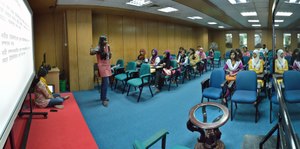
A seminar is a form of academic instruction, either at an academic institution or offered by a commercial or professional organization. It has the function of bringing together small groups for recurring meetings, focusing each time on some particular subject, in which everyone present is requested to participate. This is often accomplished through an ongoing Socratic dialogue [1] with a seminar leader or instructor, or through a more formal presentation of research. It is essentially a place where assigned readings are discussed, questions can be raised and debates can be conducted. [2]